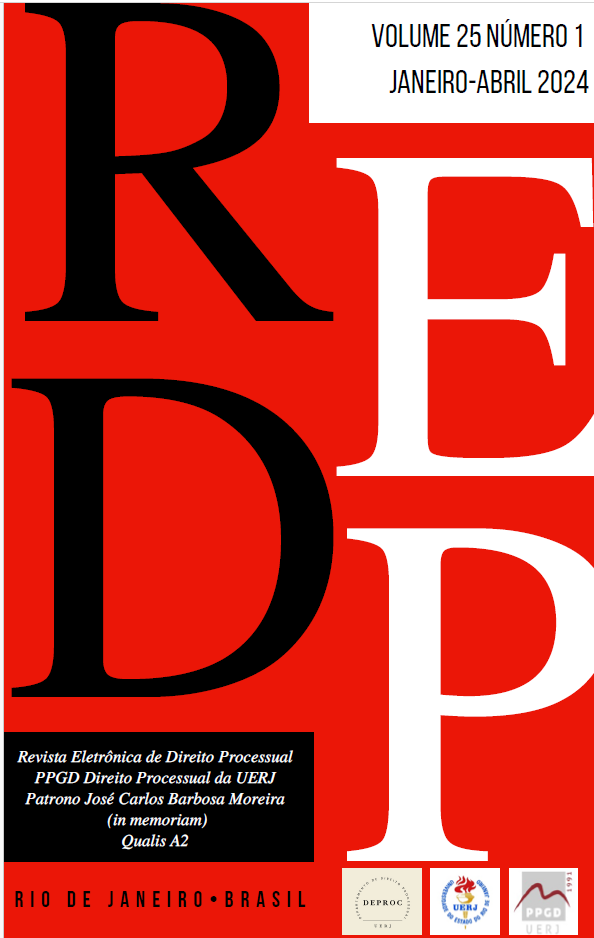A COMPATIBILIDADE ENTRE (IN)DISPONIBILIDADE DO INTERESSE PÚBLICO E DO CRÉDITO TRIBUTÁRIO COM A CONSENSUALIDADE
DOI:
https://doi.org/10.12957/redp.2024.81910Abstract
This study aims to illustrate the compatibility between preserving the public interest and utilizing consensus mechanisms in the tax context. Through a bibliographic review, we trace a historical and evolutionary journey that highlights a shift in the understanding of public law. This transformative movement is shaping a new perspective of Public Administration, even in tax collection, where more efficient and suitable approaches to conflict resolution are gaining prominence. Public law, often characterized by its rigidity and inflexibility, is adapting to better meet the needs of modern society. The traditional paradigm, which prioritized the public interest uncompromisingly, is giving way to a more flexible and collaborative approach. This phenomenon reflects a broader shift toward results-oriented public administration that is open to consensus solutions, even in the tax field. Consensus, in this context, represents a significant turning point. The adoption of methods such as negotiation, conciliation, and mediation in resolving tax disputes marks a milestone in the pursuit of efficiency and fairness. The realization that rigid enforcement of tax rules can result in endless and costly litigation is leading to an openness to seek more agile and harmonious solutions. Consensus is not only an effective response to the challenges of the tax system but also aligns with the democratic principles of contemporary society by actively involving taxpayers in resolving and preventing their tax obligations while ensuring the protection of the public interest. The concept of consensus in tax matters signifies a shift towards a more harmonious and cooperative approach between tax authorities and taxpayers. It recognizes that rigid enforcement measures alone may not always yield the desired outcomes and that fostering an environment where disputes can be amicably settled benefits all parties involved. We conclude that consensus is becoming a fundamental cornerstone in building a fairer and more efficient tax administration. This study serves as a reminder that the evolution of public law is ongoing, and consensus is a key piece of this constantly developing puzzle.
Downloads
Published
How to Cite
Issue
Section
License
Copyright (c) 2024 Marcus Livio Gomes, Eduardo Sousa Pacheco Cruz Silva , Manoel Tavares de Menezes Netto

This work is licensed under a Creative Commons Attribution 4.0 International License.
Todos os artigos publicados na Revista Eletrônica de Direito Processual (REDP) (Departamento de Direito Processual, Universidade do Estado do Rio de Janeiro, Brasil) são licenciados por meio de uma Licença Creative Commons - Atribuição 4.0 Internacional (CC BY 4.0).
Os autores retêm os direitos autorais de seu artigo e concordam em licenciar seu trabalho com a licença CC BY 4.0, aceitando assim os termos e condições específicos desta licença disponíveis no seguinte website: https://creativecommons.org/licenses/by/4.0/legalcode.
- Os autores concedem à REDP o direito de primeira publicação, de se identificar como publicadora original do trabalho e concedem à revista uma licença de direitos não exclusivos para utilizar o trabalho das seguintes formas: Reproduzir, vender e distribuir cópias eletrônicas ou impressas do manuscrito como um todo, de partes específicas do manuscrito e de suas traduções para qualquer idioma;
- O uso do artigo por terceiros é livre, contanto que a integridade da publicação seja mantida e seus autores originais, periódico de primeira publicação e detalhes de citação sejam identificados.
Dentro dos termos da licença, os autores podem entrar em acordos contratuais adicionais separados para a distribuição não exclusiva da versão publicada do trabalho na revista.
Copyright and Licensing
All articles published in the Procedural Law Electronic Review (REDP) (Department of Procedural Law, State University of Rio de Janeiro, Brazil) are licensed under a Creative Commons License - Attribution 4.0 International (CC BY 4.0).
- Authors retain copyright to their article and agree to license their work under the CC BY 4.0 license, thereby accepting the specific terms and conditions of this license available at the following website: https://creativecommons.org/licenses/by/4.0/ legal code.
- Authors grant REDP the right of first publication, to identify itself as the original publisher of the work, and grant the journal a non-exclusive license to use the work in the following ways: Reproduce, sell and distribute electronic or printed copies of the manuscript as a whole, of specific parts of the manuscript and its translations into any language;
- Use of the article by third parties is free, as long as the integrity of the publication is maintained and its original authors, first publication journal, and citation details are identified.
Within the terms of the license, authors may enter into separate additional contractual agreements for the non-exclusive distribution of the published version of the work in the journal.




